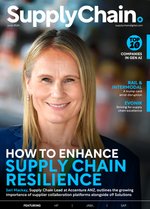How Supplier Collaboration Platforms Enhance Resilience

There can be little doubt that, in today’s business environment – one that is dominated by disruptions – companies must find new and innovative ways to ensure proceedings run as smoothly as possible.
As conflict, increased geopolitical tension and extreme weather wreak widespread havoc on supply chains, leaders find themselves in a position where they must also consider changing customer demands, a heightened focus on sustainability and groundbreaking developments in technology.
But while getting to grips with tech is often a source of headaches, it can inevitably solve the problems keeping CSCOs awake at night.
Supplier collaboration platforms are a prime example of this, providing the kinds of capabilities that not only help organisations overcome challenges, but improve their ability to manage supply chain operations in the future.
Supply chains become ‘strategic opportunity’
Throughout 2021 and 2022, firms across the globe lost out on a staggering US$1.6tn in revenue growth because their engineering, supply, production or operations were disrupted, according to Accenture.
CSCOs – and C-level executives more broadly – are therefore being challenged to take insight-driven actions to create new value and growth.
The key is to build connected supply chain networks that sense disruption and opportunity, continuously adapting while considering cost, sustainability and customer impact simultaneously.
“Leaders are re-evaluating the supply chain as not just operational, but also a strategic opportunity,” comments Sari Mackay, Supply Chain Lead at Accenture ANZ.
“Now, the solution is collaboration and partnership around a 'single source of truth'. There has been a mindset change that involves businesses recognising that maintaining their own data no longer provides the key to competitive advantage.”
Sari’s take is that collaboration with external stakeholders is needed to deliver agility, resilience, automation, sustainability, surety of supply and Big Data insights – all elements on which a successful future depends.
Such a collaborative approach has the potential to create a consortium of like-minded companies looking to find cost reductions and increased efficiency by pooling talent and resources.
Supplier collaboration platforms improving visibility
While market uncertainty has become a new normal for many businesses over the past few years, navigating continued volatility and disruption is certain to impact supply chain and business planning processes.
“Changes to business plans often involve multi-step, complex workflows – and these changes tend to impact other plans,” says Srinath goud Vanga, ML Architect at o9 Solutions.
“The complexity of these workflows poses a significant challenge for downstream systems that must understand the changes and their potential ripple effects, which can significantly hinder effective collaboration between a company and its internal and external stakeholders.”
Ultimately, the sheer scale and speed of change requires rapid responses and leaders must adopt agile ways of working more quickly.
This includes accelerating value chain transformation and strong data and analytics capabilities, which are key to understanding complexity, anticipating potential disruption and quickly developing a response.
Supply chains, as Sari points out, lack global resilience and often break down during multi-country disruptions.
She continues: “The solution, therefore, lies in supplier collaboration platforms, which are improving visibility, such as by using an integrated logistics control tower to get real-time visibility into operations.
“Additionally, IT systems continue to be expensive to run. They’re also inflexible and often over-reliant on legacy technologies. The solution here is to work with supplier collaboration platforms that support applied analytics, AI, and machine learning. It should also ensure end-to-end supply chain transparency, making risk response an integral part of business-as-usual protocols.”
Enhancing business outcomes
Accenture itself is using supplier collaboration platforms to enhance business outcomes by integrating advanced digital solutions and fostering a culture of sustainability and inclusion. Its approach involves leveraging technology to create a more integrated, responsive and efficient supply chain.
Accenture’s Sustainable Procurement Hub is a prime example of this, using blockchain technology to ensure responsible buying and promote continuous improvement in supplier ESG performance. It’s a platform that facilitates better data sharing and helps manage supplier relationships more effectively.
Meanwhile, the professional services powerhouse has collaborated with major companies like Microsoft and Bira 91 to transform their supply chains through digital innovation.
Sari explains: “With Microsoft, Accenture developed a control tower solution for Azure's supply chain, significantly enhancing inventory management and operational efficiency across a network that spans more than 30 countries, leading to increased resilience and financial benefits.
“Similarly, for Bira 91, we helped integrate various technology platforms, enhancing the company's data visibility and business process efficiency, which is critical for scaling operations and managing market volatility.
“These collaborations not only improve operational efficiencies but also drive strategic, data-informed decision-making across the companies’ global operations.”
Introducing AI
It’s difficult not to mention artificial intelligence (AI) in the supplier collaboration conversation, especially when discussed in conjunction with supply planning.
Srinath advocates the integration of large language model (LLM) agents within planning systems to accelerate digital transformation and add new capabilities.
However, despite the tremendous potential generative AI (GenAI) offers in regards to the transformation of business planning, he warns that its practical implementation comes with challenges.
“Like any AI model, the results from LLM outputs come with varying degrees of confidence,” he highlights. “Their responses may not always be factually accurate, underscoring the need for guardrails and robust verification processes within planning platforms.
“Additionally, ensuring smooth interoperability between LLMs and existing planning systems, with their diverse inputs and outputs, is essential for a seamless integration and to avoid workflow disruptions.”
LLM agents must also be adaptable to increase their utility across domains and processes. Domain experts must be able to extend the agents’ knowledge and customise their behaviour.
Srinath says a GenAI digital assistant should provide the tools and support required to make this customisation easy and ensure alignment with a business’ specific needs.
“Despite these challenges, the potential of AI to enhance supply chain planning productivity and drive operational excellence is immense,” he concludes.
“By thoughtfully integrating GenAI into their planning capabilities, enterprises can unlock the full potential of their data, empowering their teams to make better, more informed decisions.”
******
Check out the latest edition of Supply Chain Magazine and sign up to our global conference series – Procurement and SupplyChain LIVE 2024.
******
Supply Chain Digital is a BizClik brand.
- Accenture: Supply Chain Leaders want more GenAI TrainingDigital Supply Chain
- Five Minutes With: Karolina Tuttle, o9 SolutionsSupplier Relationship Management (SRM)
- EU Supply Chain Law: Key Supply Chain Consulting FirmsSustainability
- How o9 Solutions is Increasing Supply Chain VisibilitySupply Chain Risk Management

